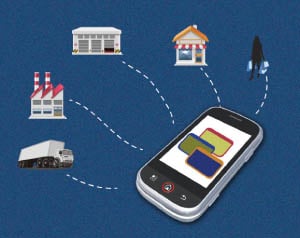

While a company’s supply chain is just a set of processes and actions, it might as well be a living and breathing thing. Supply chains evolve as quickly as anything else within an organization’s structure whenever there are advances in technology.
An efficient and effective supply chain is the gold standard but it can be tough to hold something to that standard when it is constantly changing. Companies are starting to enhance their supply chain performance by converting to a mobile supply chain – which means they are infusing their supply chains with mobile technology. This mobile technology improves speed, accuracy, and output when properly utilized.
In this article, we’ll take a look at the characteristics of a mobile supply chain and the benefits for companies who are using or are considering using a mobile supply chain.

A mobile supply chain is using smartphones or portable laptops or other technology to complete tasks within the supply chain. These devices can provide full functionality and access to a company’s business systems without any sort of limitations. Mobile devices today have incredible processing power, which provides companies an alternate avenue for running their supply chain processes.
Instead of keeping supply chain managers in the office for the normal 9-5 grind, companies can have their employees anywhere and everywhere while still giving them full access to the supply chain. This type of mobility is a major coup for companies who operate around the clock. A supply chain manager who is off the clock can still take care of any situation that may pop up while they’re on the go no matter what time of day or night an issue occurs.
Business intelligence applications give companies and their supply chain workers a live look into processes and procedures wherever they are throughout the day. This real-time look into data, statistics and production levels enables companies to change course at a moment’s notice. The ability to take an accurate look into how the supply chain is functioning at any given time is making it easy for companies to identify areas of concern. Companies can then prioritize their focus to address any areas that need improvement without having to be in the office.
Imagine being able to see exactly what your warehouse employees are working on and exactly where they’re at with their task. Mobile applications and devices are providing companies with that advantage. There are wearable and handheld devices a warehouse employee can use applications, company software systems and send a variety of information instantly with others in the warehouse or colleagues higher up in the supply chain ladder. Anyone with access to the supply chain operations and applications can exchange information instantaneously, which cuts down on multiple emails and phone calls trying to share the correct information.
When everyone from the ground up can use mobile applications to speed up tasks, which frees up more time across the supply chain. When companies have better results in less time, they can allocate their resources to problem areas of their supply chain without having to worry about a bottleneck somewhere else. A mobile supply chain helps companies step out of a rigid mold and into processes and tasks that can be modified on the fly without fear of a reaction through the rest of the supply chain. The ability to adapt on the fly is becoming so important as supply chains adjust to new technology, consumer habits and pressure to be as lean as possible.
Without an accurate inventory, a company has no idea if they need to empty the shelves or if they’ll be empty in a week. A mobile supply chain provides more visibility into a company’s inventory tracking and processes. This visibility allows companies to analyze historical data to see where their peaks and valleys are within the sales cycle. Having access to this data from any mobile device can help supply chain managers improve their replenishment habits, which will lead to savings. Ordering the right amount of product will leave less sitting on warehouse shelves for extended periods of time, which costs companies money as they cannot use this space for other product.
Mobile supply chains are becoming the norm across many industries because of the benefits it provides. Companies are seeing improved accuracy, faster communication, increased productivity and savings through their inventory and other supply chain processes. Mobile supply chains are moving faster and companies who are not integrating this technology into their current supply chain model would be wise to take a look at how they could benefit from mobile applications.